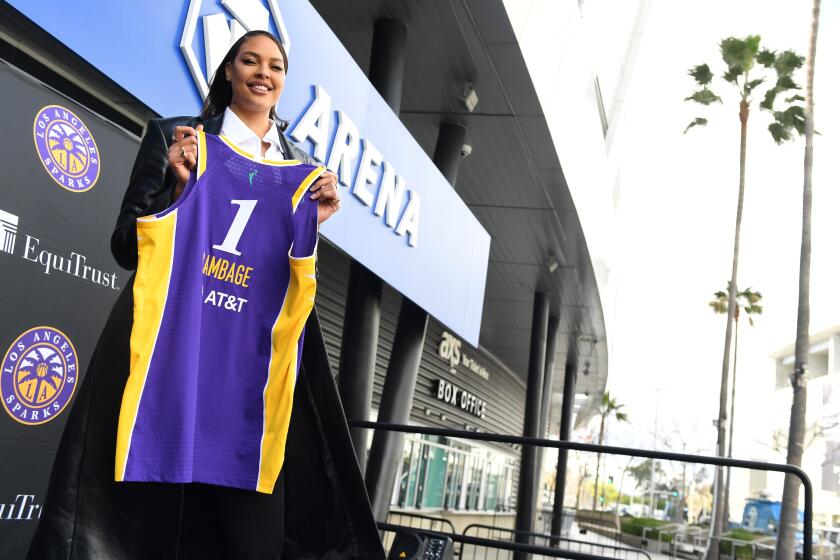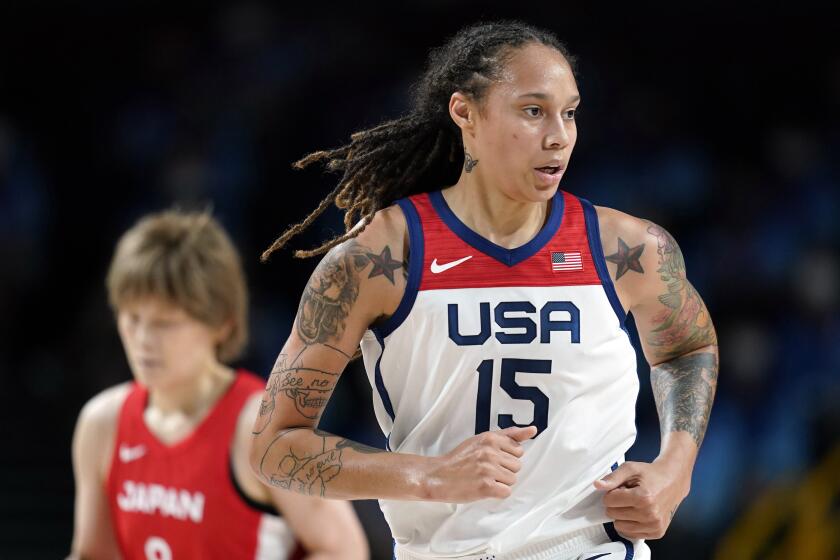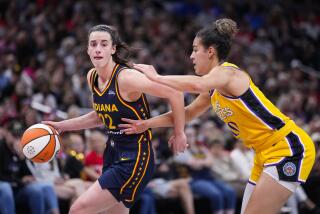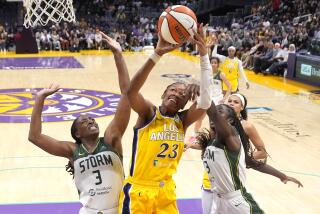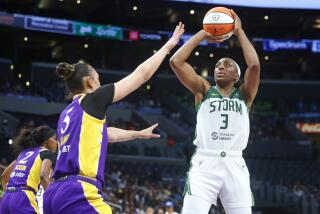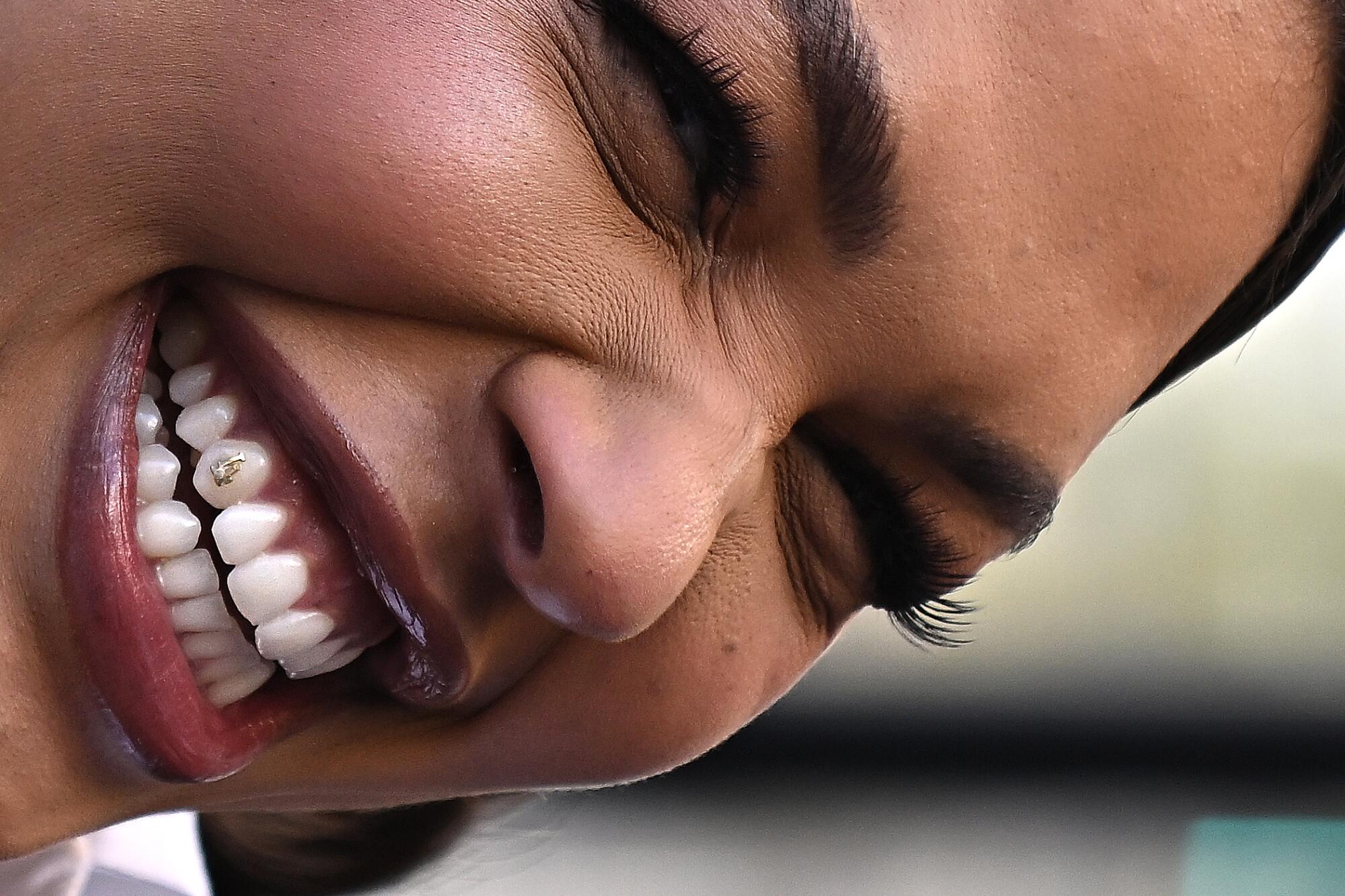
Sometimes Liz Cambage wonders what she’s doing here.
Not Los Angeles. That part she knows. It’s because of a pinky promise the 6-foot-8 Australian center made in August 2018, in the midst of a career year for the Dallas Wings in which she would win the scoring title. The Wings’ season had started out strong, but after an eight-game skid, head coach Fred Williams — who’d helped persuade Cambage to return to the WNBA after a long stint abroad — was fired in dramatic fashion, outside of the team locker room after a game.
Cambage was devastated. In just three seasons, she’d already developed a complicated relationship with the WNBA. When she was drafted second overall by the Shock in 2011, she had never even heard of Tulsa. After the Shock went 3-31 that season, Cambage decamped for China for a year, where she earned 10 times her rookie salary; she returned to Tulsa in 2013, then took a four-year hiatus from the league at the end of that season. By the time Williams convinced her to sign with Dallas — which had relocated from Tulsa in 2016 — Cambage had proved she didn’t need the WNBA to have a successful basketball career. And now, her coach and trusted advocate was gone. It was yet another crushing disappointment.
When Williams returned to Dallas to pack up his house, he and Cambage had dinner to say their farewells, and they ended up talking about Los Angeles. Williams had grown up in Compton, and started his coaching career as an assistant at USC in the ‘80s, where he initially made $500 a season and coached Trojans great Cheryl Miller. Cambage, for her part, knew she eventually wanted to play for the Sparks.
“L.A. is his home, and L.A. is where I always wanted to be,” Cambage recalls. “We made a pinky promise then and there we were going to end up [here] together.”
That schoolyard vow was realized in February, when the free agent agreed to a one-year deal with the Sparks and reunited with Williams, who has been a Sparks assistant under head coach Derek Fisher since 2019. With the Sparks, Cambage fills a hole in the paint that Candace Parker left when she signed with her hometown Chicago Sky before the 2021 season, and gives a necessary lift to a team that missed the playoffs for the first time since 2011.
So Cambage knows why she’s in L.A. She’s been waiting for this moment for years. Hers is a more fundamental question, tied to unresolved questions about pay equity and treatment in the world’s premier pro women’s basketball league.
Sometimes Cambage — a four-time All Star who holds the league record for points scored in a game yet considers herself the “black sheep” of the league — wonders what she’s doing in the WNBA at all.
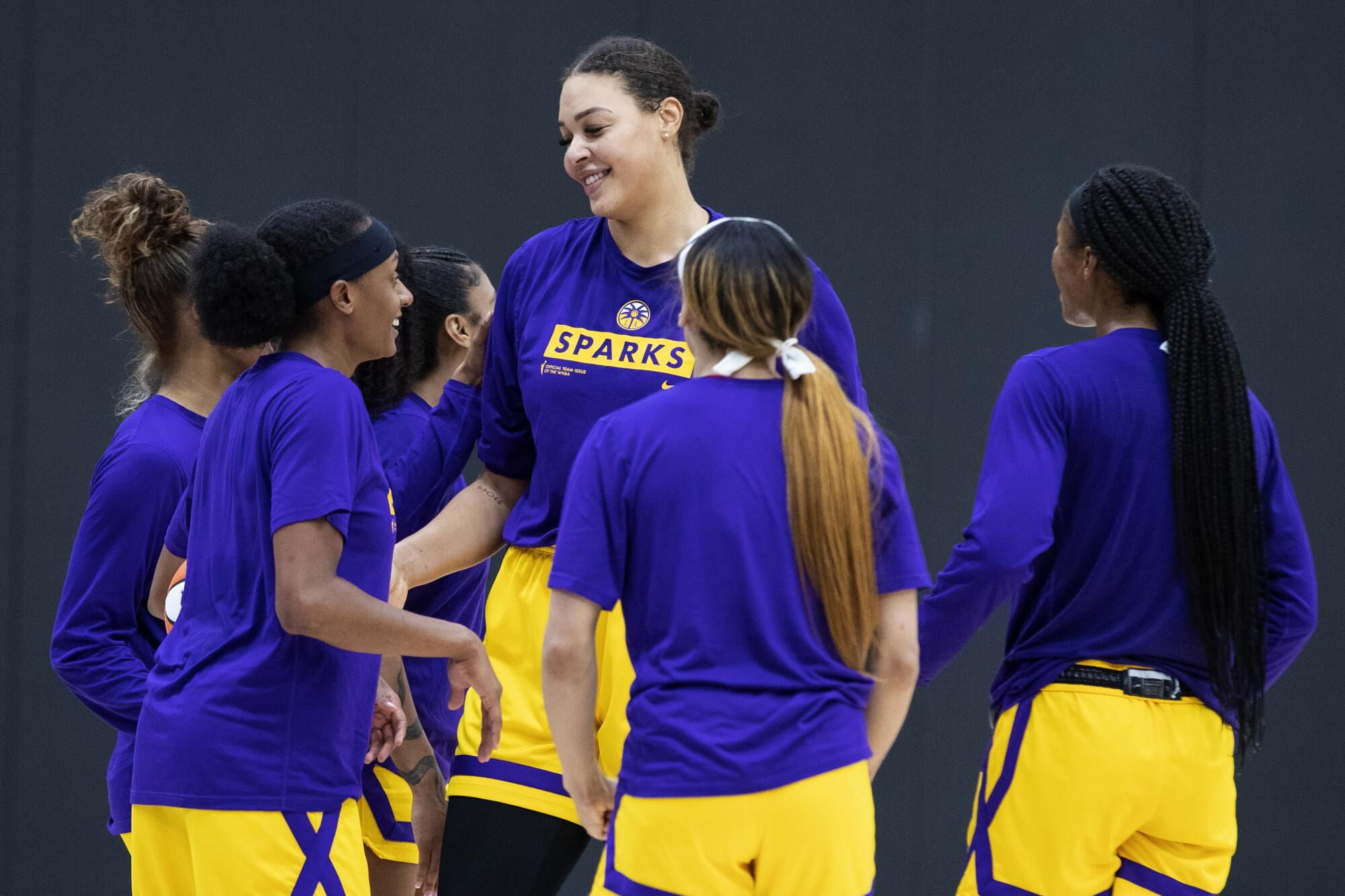
::
But first, about Cambage’s longtime draw to Los Angeles. It’s relatively close to home, under 16 hours on a direct flight to Melbourne, where mother Julia works and lives with Cambage’s grandmother. Fellow Australians, she said, are “everywhere” in L.A.; she’s partial to Aussie-owned restaurants EP & LP in West Hollywood and Great White in Venice. Cambage also DJs on the side (she recently played Red Rocks in Colorado) and has long been enticed by the music scene here.
Since joining the Sparks, she’s been settling into the city like any recent transplant. She signed a lease on a place in Bel-Air (growing up watching “The Fresh Prince” in Australia, she had no idea Bel-Air was a real place), and is looking to buy her first car (she’s in the market for a Mercedes-Benz G Wagon, thanks to a teenage obsession with early-aughts hip-hop music videos that popularized the ride). When she talks about commuting to training camp at the Lakers’ UCLA Health Training Center every day, she hesitates and pronounces “El Segundo” like a question.
“Did I say it right?” she asks, and looks relieved when I tell her she sounds like a local. “I’ve been butchering that for so long. This week I’m finally saying it right.”
“This season is going to be the first of my career where I’ve been surrounded by so much love and support and fans and friends in the same city.”
At 30, Cambage is the kind of player who could transform any team she’s on — if only she’d stick around long enough in the league to prove it. She has a tendency to say things that can get her in trouble, and, from a fan perspective, a somewhat maddening willingness to walk away from professional situations that don’t immediately gratify her.
Still, over five seasons in the WNBA, she has shot 54% from the field and averaged 7.7 rebounds a game. She was an All-Star in four of those seasons, and runner-up for league MVP behind Breanna Stewart in 2018, when she scored a league-record 53 points in a game. Cambage’s presence also changes the game in less obviously quantifiable ways: her size opens up the floor by drawing double- and triple-teams in the paint on most possessions, and she has a knack for finding her open teammates when defenses collapse around her.
“She’s an easy person to feel like you have to get the ball to every time down the court, and she wants the ball every time down the court,” said Fisher, who compares her to his former Lakers teammate Shaquille O’Neal. “But the way she’s shown herself as a willing passer — that’s gonna carry us so far.”
Williams, who’s coached some of women’s basketball’s greatest over the years, puts Cambage in his top five of all time. “I’d put her alongside Cheryl Miller, Lisa Leslie, Tina Thompson,” he said. “She doesn’t back down.”
The Sparks introduce Liz Cambage, a four-time All-Star and two-time All-WNBA center on Wednesday at Crypto.com Arena.
Cambage’s contract is just one year, but it comes, crucially, with her buy-in and enthusiasm. Her dissatisfaction in Tulsa and Dallas was not just about geography, though it didn’t help that her family had to “land, get on another plane, another stop, another bus” every time they came to see her. By the end of her 2018 season in Dallas, Cambage had played for five coaches in just three WNBA seasons and was making a fraction of her overseas salary.
Her two seasons with the Las Vegas Aces were more stable; under Bill Laimbeer last year, the Aces were 24-8 and lost to Phoenix in the Western Conference semifinals. Compared with Tulsa and Dallas, Vegas was more Cambage’s speed, but she had issues with the hard-partying lifestyle and the weather.
“Waking up and it’s 120 [degrees]?” she said. “I’m not a rattlesnake. I need the ocean.”
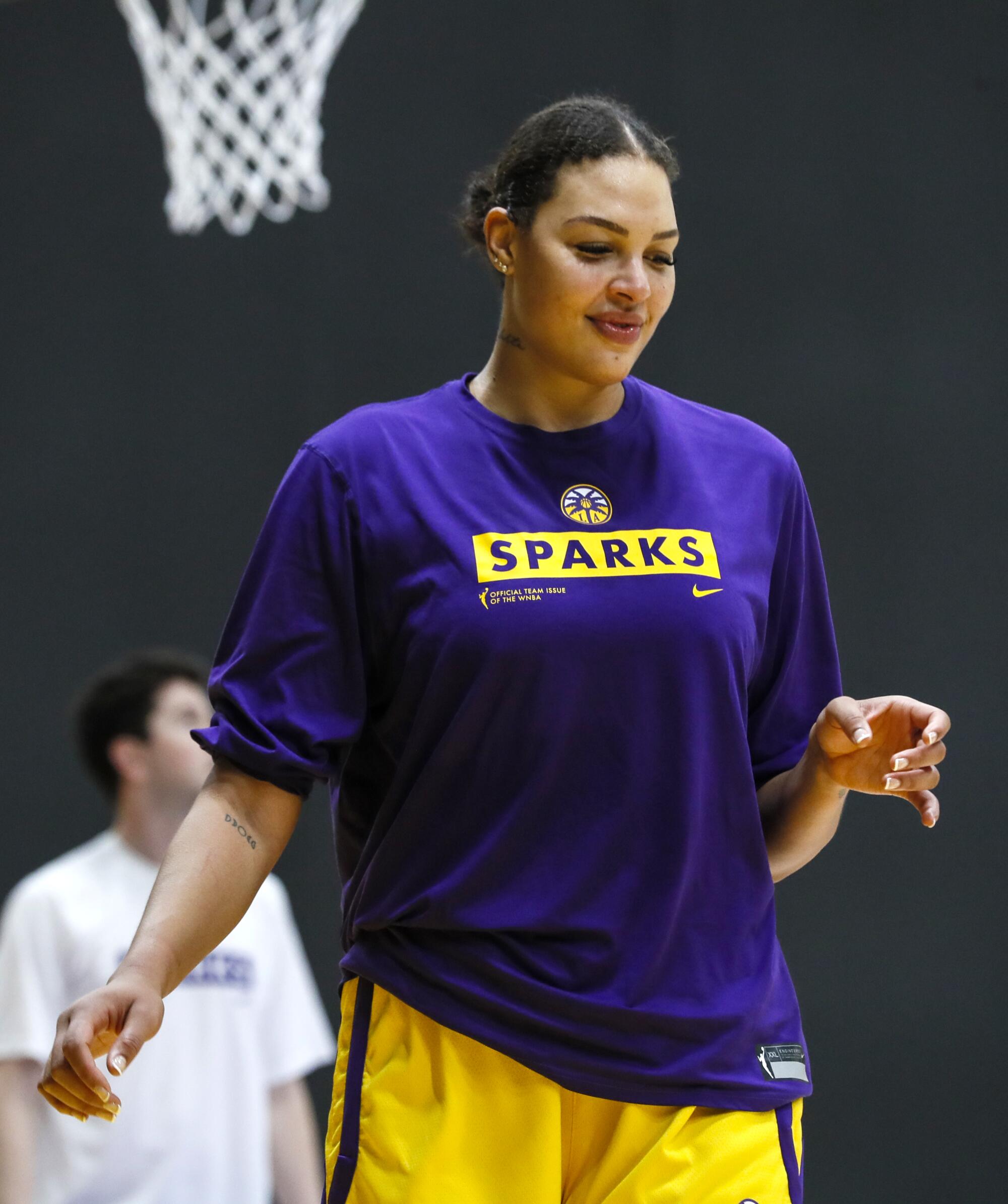
Cambage had made no secret of her desire to eventually wind up in L.A., and in interviews with coaches and teammates, the word that kept coming up in describing her current state of mind was “balance.” There’s a sense that she’s matured into a more settled version of herself, and a guarded optimism that — 11 years after she first signed with a WNBA team — L.A. might finally be the right place for her.
“There’s a reason I wasn’t in L.A. earlier,” she said. “When I was younger, I wanted to do everything.” Now, she says, “I’m too old to be going to parties in the hills. I literally don’t have the energy for it. This summer, I’m just focused on the team and looking after myself.”
Looking after herself is not a task Cambage takes lightly. She is open about her mental health struggles. In a 2019 essay for the Players’ Tribune, she wrote about taking medication for anxiety and being put on a suicide watch after a particularly difficult stretch in 2016. Today, Cambage says, “I’m still medicated for my anxiety. And while I’m living a lifestyle that is so pressured, I probably will stay like this.”
But she has not had a panic attack since moving to L.A. “The times I really felt that pressure and spiral have been when I’m juggling too much,” Cambage said one day after training camp. “Now, I’m at a place where I’m keeping my plate nice and light. I’m not weighing myself down with too many things to do.
“This season is going to be the first of my career where I’ve been surrounded by so much love and support and fans and friends in the same city. It’s a dream come true.”
“I don’t have that little gold star that the WNBA seems to give every UConn player.”
At a preseason game in Northridge, in which the Sparks beat the Phoenix Mercury 87-84, Cambage fouled out in the third quarter. She jawed at the officials over the deciding call, then retreated to the exercise bike for a bit. But by the fourth quarter, she’d loosened up, flexing at Sparks rookie Olivia Nelson-Ododa after she’d secured a strong board and dancing to Montell Jordan’s “This Is How We Do It” during a timeout. On Friday, she’ll get her first regular season action for L.A., when the Sparks take on Parker and the defending champion Sky in Chicago.
Being in L.A., Fisher said, seems to “settle” Cambage. “There’s a combination of things that mean we’re about to see the best of her,” he said.
“And that’s scary for everybody else.”
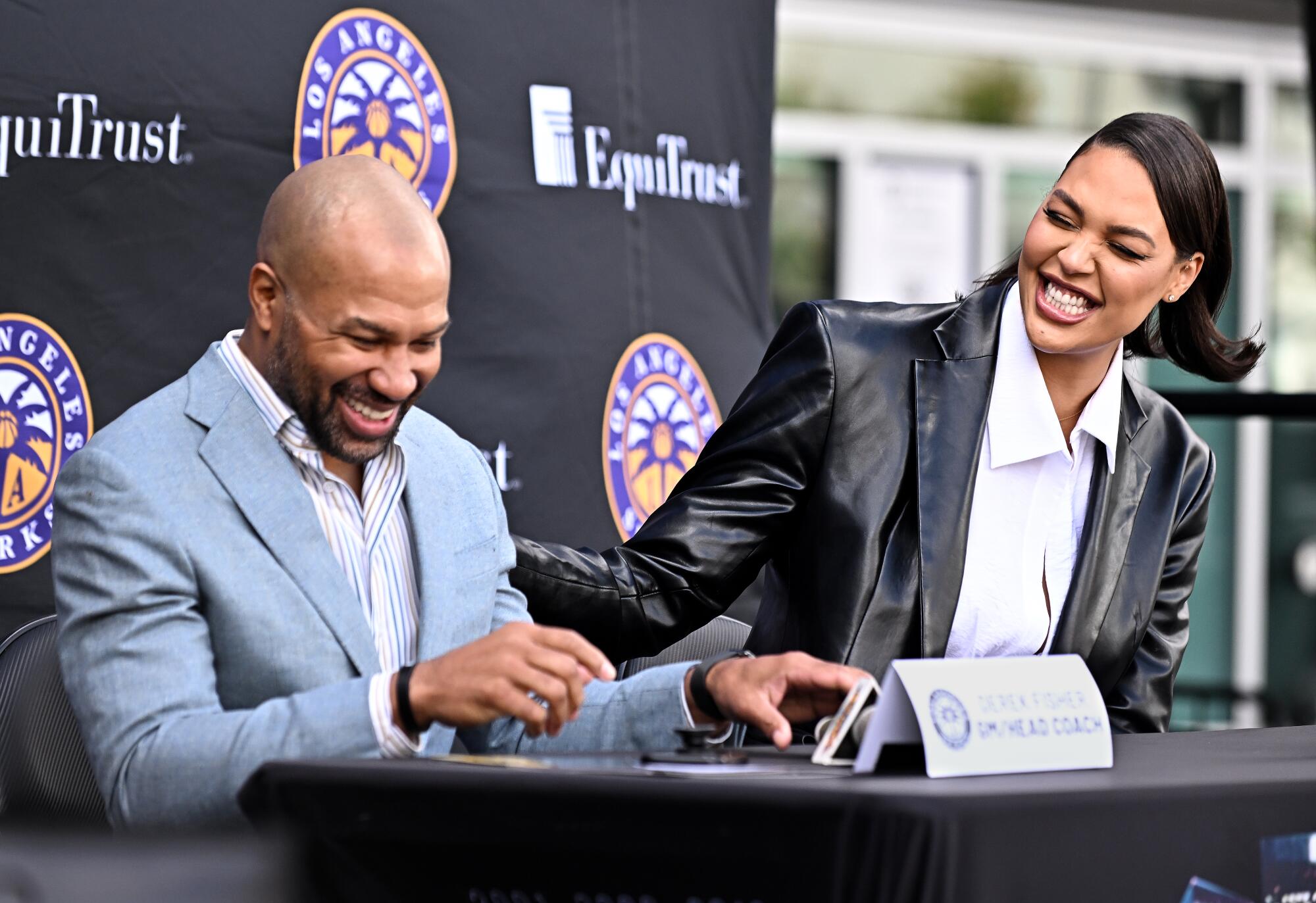
::
Cambage is perhaps known as much for her pugnacious streak as she is for her size and her shooting range. She has a knack for getting into on-court tussles and a seemingly singular penchant for technical fouls. Her new Sparks teammate, Brittney Sykes, recalls she and Cambage cursing each other out in a game in Las Vegas last season. When I ask Cambage about it later, she can’t place the incident.
“It’s just another day for me,” she said. “The amount of techs I’ve had, it’s ridiculous.”
In 2019, Chicago’s Allie Quigley accused her of calling an opponent a “fat ass” on the court (a charge Cambage vehemently denied), and her relationship with Australia’s national team more or less came to an end last year after she was involved in an undisclosed altercation in a pre-Olympics scrimmage against Nigeria.
To borrow a term from pro wrestling, this reputation has made Cambage the closest thing the WNBA has to a heel (also known as the ring villain, sent in to cause trouble, kick ass and generally rile up the crowd). It’s an interesting role in a league that has not only condoned, but even fostered a particular brand of outspokenness among its players in recent years.
Since 2016, when the WNBA fined three teams for wearing warm-up shirts in solidarity with victims of police shootings across the country, the league has adjusted course on its treatment of player activism. (Those fines were met with immediate backlash and were quickly rescinded.) In 2020, when the pandemic forced the season into a bubble campus at IMG Academy in Bradenton, Fla., that activism coalesced around a Georgia Senate runoff race. WNBA players were instrumental in helping to elect Raphael Warnock over Kelly Loeffler, the Republican candidate and former Atlanta Dream co-owner who had taken issue with players’ involvement in, and support for, the Black Lives Matter movement.
That same year, the league agreed on a groundbreaking new CBA that granted players higher salaries, improved travel conditions and paid maternity leave, among other things. In pro sports, the WNBA has led the way on making political involvement, activism and advocacy an integral part of its brand.
But Cambage exists outside of the league’s more sanctioned avenues for change. Her Sparks teammates, sisters Nneka and Chiney Ogwumike, are Stanford graduates with prominent positions in the WNBA Players’ Assn. In their roles as president (Nneka) and executive committee vice president (Chiney), they advocate for players’ rights in closed-door negotiations with league executives. By contrast, Cambage is a foreigner who never played for a blue-chip university and is not eligible for Team USA. She is, by her own classification, the league’s “black sheep,” known for physical play and trash-talking on the court and doling out unbridled criticism of the WNBA’s business operations off of it.
“I speak truths,” Cambage said. “I’m going to tell you how it is and what I’m going through just to get to a game on the road.”
She has spent the last few months doing just that. In February, after Aces owner Mark Davis lured former WNBA great Becky Hammon away from the NBA’s San Antonio Spurs with a $1-million coaching offer, Cambage tweeted, “Ahhh yes the WNBA, where a head coach can get paid 4X the highest-paid players super max contract. And y’all think imma spend another season upgrading my seat on a flight to get to games out of my own pocket.”
The tweet covered two pressing issues many players have with the league’s improved, but imperfect CBA. When Cambage signed with the Sparks a few weeks after the details of Hammon’s blockbuster deal were announced, she reportedly agreed to a salary of $170,000, which is well below the supermax (currently $228,094); the deal ensured her new team would have salary space to round out its roster with 12 players.
“Playing in the league for me period is a pay cut,” Cambage said. “So I’m quite fine taking a cut if it means having more talent and more bodies around me.”
Cambage’s complaint was not with Hammon’s salary but with the relative limits on player salaries. Yet it was still treated by some as “women tearing each other down.”
“People manipulated that and tried to villainize me for literally just stating facts,” Cambage said. “I love Becky getting her dollars up. But how do you have a coach making more than the whole team’s salary cap? That’s insane. How is that a balance?”
She pauses, riled up again by the basic math of it. “Why do I even want to play in this league?
“I’m lucky that I do work extra and have so many other careers funding my life,” she said. “I’m just here because I like to hoop.”
In addition to having played abroad in China — where, like most WNBA players, she had earned many times her WNBA salary — Cambage DJs, co-owns multiple businesses back home in Australia and has built out a sizable following on OnlyFans, a subscription-based social media platform that first became known for hosting adult content. (She won’t share how much she’s earned on the platform, but said that after only five months, she’s halfway to her goal: “It’s the fastest money I’ve ever made.”) It’s another way in which Cambage differs from the league’s other big stars, cobbling together a kind of DIY income on the side while players like Parker and Nneka Ogwumike increasingly enjoy a more national profile and appear in major ad campaigns.
The WNBA, meanwhile, is in the midst of an optimistic growth mode. ESPN viewership is up 24% compared with pre-pandemic numbers, and Commissioner Cathy Engelbert has her eye on marketing growth and league expansion moving forward.
But the charter flight issue remains, a useful measure for how far the WNBA has to go in meaningfully valuing its players’ labor. Despite an increased willingness among owners to pay out of pocket for private flights, WNBA teams are required by the CBA to fly commercial. (After the 2021 season, the league fined New York Liberty owners Joe and Clara Wu Tsai $500,000 for violating the policy.) Teams must book their players in Comfort Plus seats, but that’s not helpful for a 6-foot-8 player like Cambage. She estimates she spends $5,000 to $8,000 a season to upgrade her tickets to first class.
“I’m not sitting in the exit row,” Cambage said. “If you’re under 6-5, you’re fine. But players like me and Brittney [Griner], that’s gonna come out of our pocket.”
The charter issue became more pressing during the pandemic, when teams were flying before most of the country had been vaccinated. More recently, the end of the airline mask mandate has yet again increased risk for WNBA players. Because it was assumed that the Lakers and Clippers would both be hosting playoff games at Crypto.com Arena in May, the Sparks will play eight of their 11 games that month on the road, and will therefore be regularly exposed to unmasked travelers.
After practice one day in El Segundo, Fisher spoke to the team about the new rule, and encouraged them to mask up for one another’s safety. This added logistical wrench, Ogwumike said, only “makes it more evident what needs to be done.”
“I personally think airports are the dirtiest places in the world,” Cambage said. “And the fact that we’re in [them] every other day, when there are owners out there that want us to fly private? And the league literally doesn’t allow it? It’s crazy to me.”
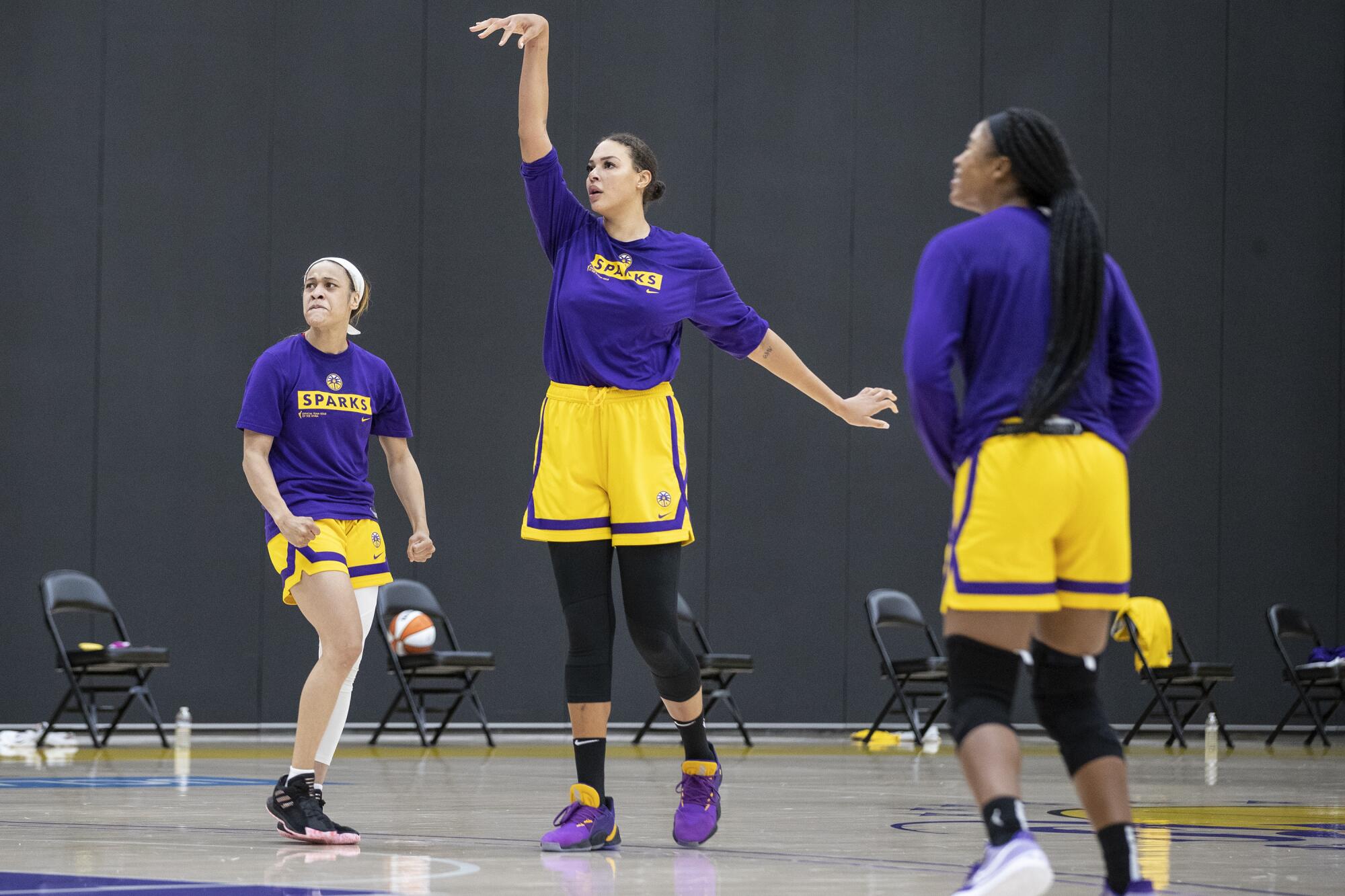
::
Mark Davis, who also owns the NFL’s Las Vegas Raiders, bought the Aces before Cambage’s second season in Vegas, and for the first time in her WNBA career she saw how she thought a team should be run. “It was the best-run organization in the league,” she said. “There are owners that are trying to treat us on a level that we should be treated. Is it financially stable for the league? No. But just knowing that there [are] owners out there that want to invest and want the best for us is super empowering.”
Cambage has no plans to edit herself on this topic, or any others, moving forward. In multiple interviews over the last month, she refrained from commenting only once (on Griner’s detainment in Russia), and only briefly checked herself, after wondering aloud how invested ESPN is in the WNBA given its limited number of nationally broadcast games. (“I don’t know if I should be saying that,” Cambage said, after a pause. “How many people can I piss off?”) She understands her willingness to speak up as a responsibility conferred upon her by her outsider status in the league.
WNBA star Brittney Griner was urged to play in Russia to help offset pay inequity. Her agent is pushing to help bring her home and calling for change.
“Other than me, I don’t really see anyone being truly vocal,” Cambage said. “I don’t know if it’s just because I’m not American and I’m like, ‘What are you gonna do to me?’ I’m not gonna make Team USA. I’m already not protected. I’m already not one of the favorites of the league. I don’t have that little gold star that the WNBA seems to give every UConn player.”
“I don’t really suck ass,” she said with a laugh. “And I’m not about to.”
“The older I get, the more I realize I love hooping. It’s the game of the game, off the court, which I really struggle with.”
“Being from Australia, not going to a school [here], she’s fallen into an interesting bucket,” said Ogwumike, who’s grown close to Cambage in recent years. “Coming into a foreign league and dominating, that can make people feel threatened.”
But she has no problem with her new teammate’s candor. “What I love about Liz is that she is authentically herself,” Ogwumike continues. “She likes to shoot it to people straight, and she appreciates transparency from others. I really respect that.” As for the WNBPA, it “answers to the players.” She said Cambage’s frankness “holds us accountable. And I’m hoping [it does] for the league as well.”
Ogwumike said Cambage has told her one reason that she’s happy to be in L.A. is to learn about the WNBPA firsthand through her teammates’ involvement. When I ask if Cambage might wade into the business side of the league when her playing days are over, she demurs: “I don’t even feel wanted now.”
But when I push her about what she’d do as commissioner for a day, she quickly dispenses a three-step plan for improving the league — “all things I’ve applied to my life.” She’d talk to owners to see which of them, like Vegas’ Davis, want to “truly invest in the league”; she’d make family planning benefits for all players universal, regardless of how long they’ve been in the league; and she’d seek to expand exposure with an increased marketing budget.
Still, she insists that side of things is not for her.
“The older I get, the more I realize I love hooping,” Cambage said. “It’s the game of the game, off the court, which I really struggle with.”
But she’s confident that, all these years and one consequential pinky promise later, she’s finally in the right place for it all to come together. “I’m surrounded by people that actually care and want the best out of me,” Cambagesaid. “I’m where I need to be.”
